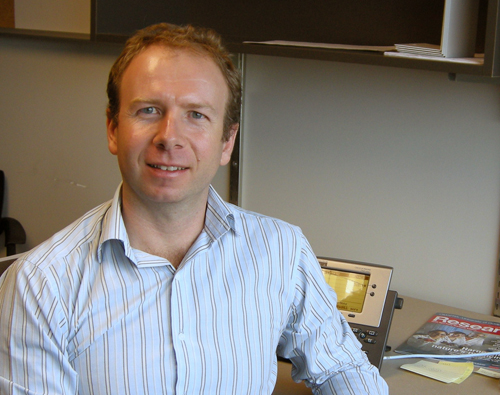
For every cell in your body, there are about 10 bacterial cells living on you. No need to urgently wash up with some disinfecting soap: those bacteria are actually necessary for your health and survival.
Psychology professor Kieran O’Doherty works to develop our understanding of the bacteria living in and on our bodies, in collaboration with researchers mapping bacterial DNA as part of the Human Microbiome Project. The other participants are biologists and microbiologists, but O’Doherty sees the participation of a psychologist as invaluable. “I’m interested in the social and ethical implications of this kind of research,” he explains. “How do we think of ourselves when we understand that we are teeming with bacteria, and that these bacteria are essential? How does this affect health care and disease prevention, both for individuals and for our society?”
This current project ─ funded by the Canadian Institutes of Health Research ─ is a natural follow-up to O’Doherty’s work on health topics and public communication of issues. His PhD thesis studied how the results of various genetic tests were discussed with cancer patients.
“People who had been diagnosed with cancer would be referred to the service, and tested to see if they had genes that meant they were predisposed to cancer,” says O’Doherty. “My focus was to see how this information was communicated to family members. Should their children or other relatives also be tested? How would this knowledge change their lives? I studied the information exchange between the counsellors and the clients, looking at how risks were framed and options offered.”
His interest in health topics, he adds, is not so much about the science, but “about the implications when science enters society. I ask how this new knowledge changes us, how do we live in a society with this research or new development?”
O’Doherty was born in Austria and grew up in South Africa, where he completed his undergrad studies at the University of the Witwatersrand. He originally majored in physics and chemistry but took psychology as well. His graduate studies, all in psychology, were completed at the University of Adelaide. After working in private industry, O’Doherty realized that his interests lay in research and the academic life, so he took a post-doc position at the University of British Columbia’s Centre for Applied Ethics. (“I’m working my way through the continents,” he jokes.)
While he was there, a faculty position opened up and he was able to continue his research. He came to the University of Guelph this past November because the position available here was “a surprisingly good fit,” he says. “The department was looking for someone to teach qualitative research methods, which are not that commonly used in psychology.” Qualitative methods involve in-depth interviews and focus groups, with careful analysis of the words and language used in the responses.
Another qualification the department was looking for was research in public or community engagement. O’Doherty had begun studying these issues while at UBC, developing methods to gain community input into policy on human tissue bio-banking.
He says medical researchers who want to study cancer might go to a hospital and ask for tumours from patients. Repeated requests and the work required to locate human tissue for studies becomes expensive and time-consuming, so some researchers have promoted the development of bio-banks, storing various tissues for future research. While this sounds convenient, O’Doherty says there are many potential ethical complications. “Normally when requesting that someone participate in a study, the researcher has to give full disclosure to the person on the purpose of the study. A bio-bank can’t do that. The tissues are being stored for future studies that may not even be thought of yet.”
O’Doherty finds that often researchers and scientists see the solution as simply educating the public, but he disagrees. “You have to get feedback from the public as well.” His strategy is to have experts provide information to discussion groups and then allow the community members alone to discuss concerns and make recommendations.
This is important, he adds, because bio-banks are now widespread and are increasing their scope. “There is talk of linking bio-banks from different countries, to get bigger numbers for research,” he says. “It’s complicated enough to manage ethical issues in one country, but much worse when you have several involved.”
While in B.C., O’Doherty also worked on a project to map the genes of salmon, which scientists argue will help both in conserving the fish and in breeding salmon with desired qualities. “Salmon are very important to the economy in B.C., so it becomes a political and controversial project,” he says. O’Doherty’s task was to involve the public and gain input on the topic.
His track record of collaboration with researchers in other fields also makes him a good fit at U of G. “Some people see involvement in interdisciplinary research as a career risk,” he says. “But this interdisciplinary work often has wider application. I’m glad that it is really valued here.”
O’Doherty is recently married, and enjoys participating in martial arts and reading science fiction in his spare time. Favourite authors include Iain M. Banks and Neal Stephenson. “I love to just hide away with a stack of books sometimes,” he says.